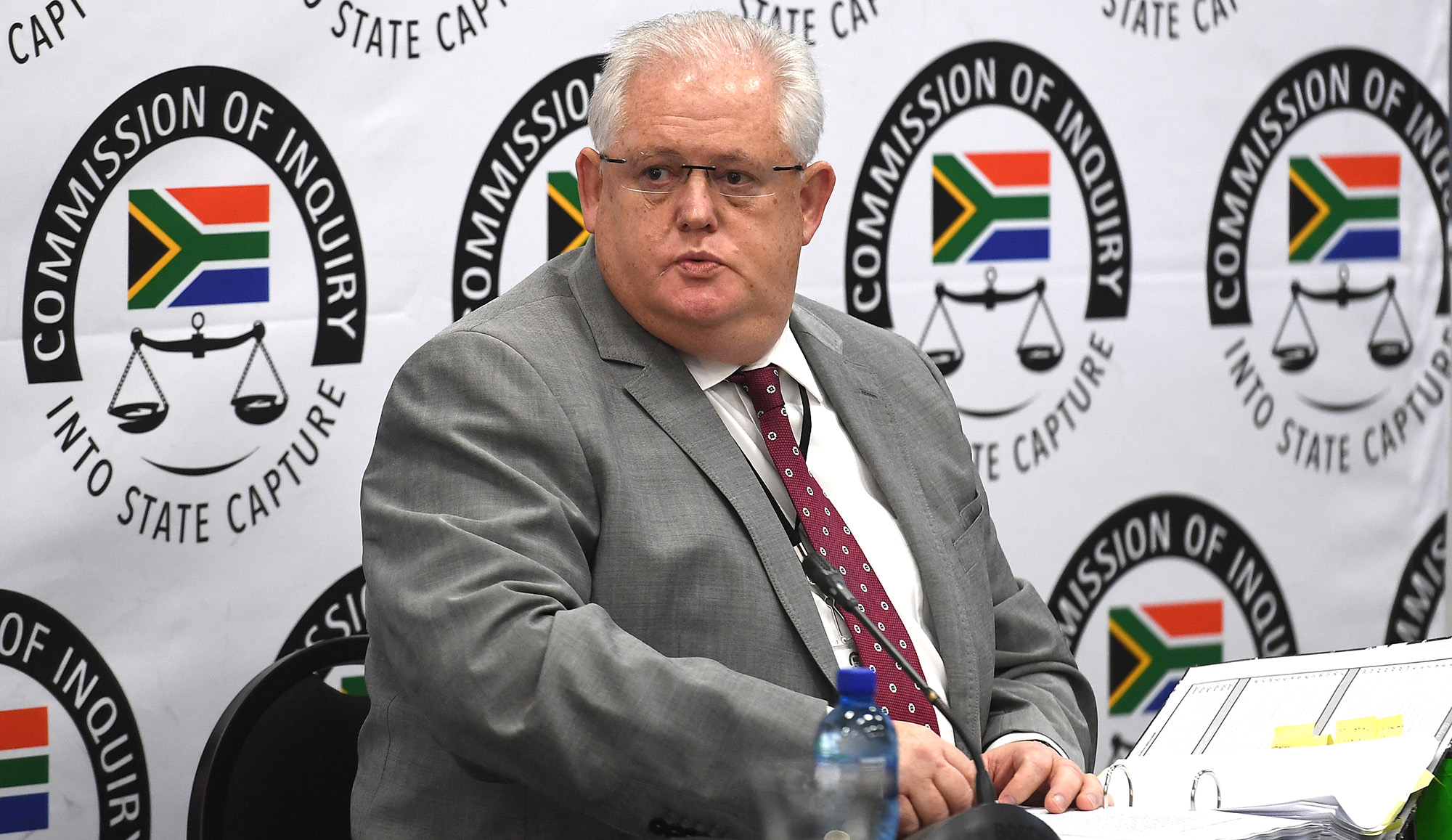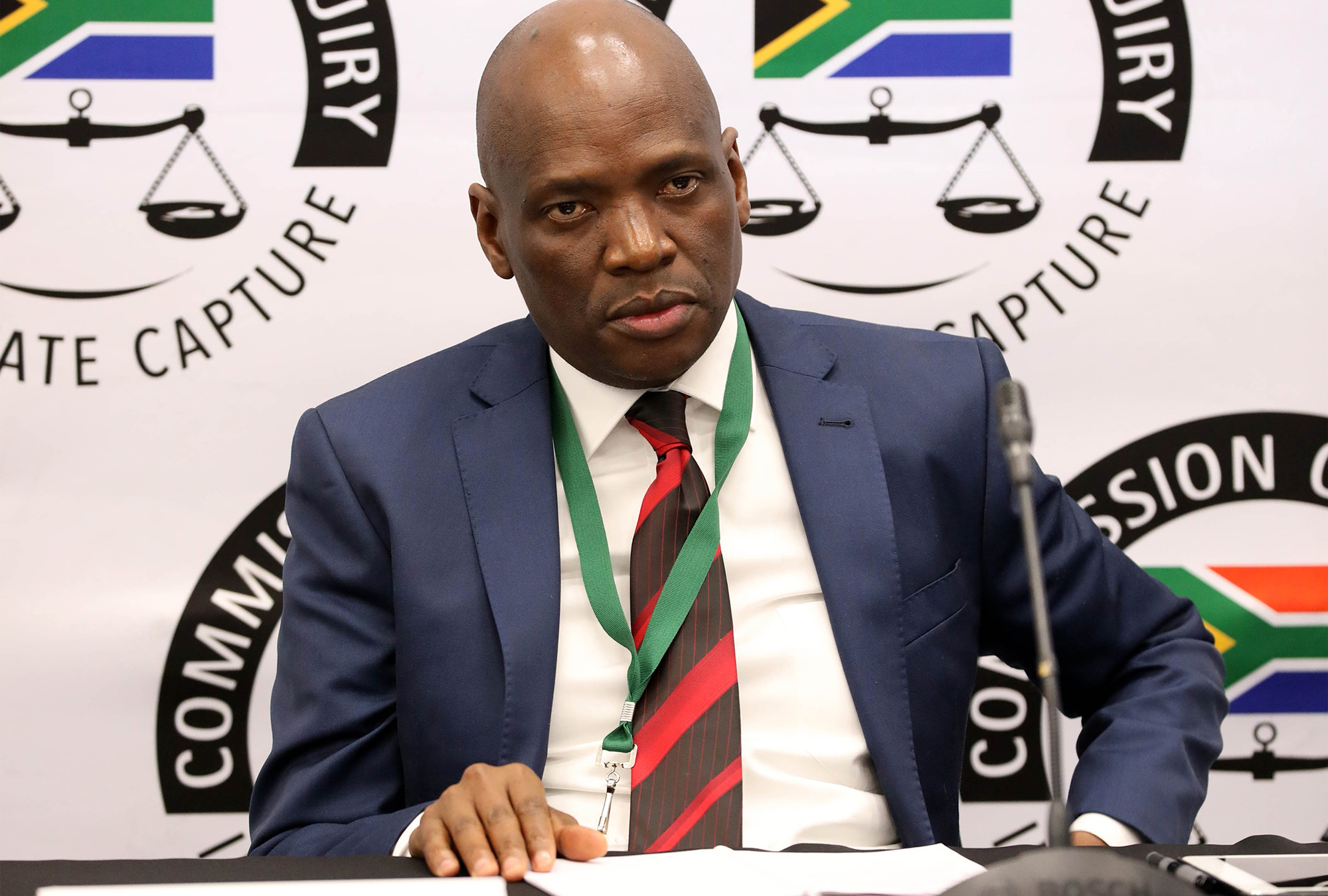In August 2019, a year into the existence of the Zondo Commission of Inquiry into State Capture, some figures were revealed. The commission at that stage had cost R356-million to run. 92 people had delivered oral evidence and more than 700 had been issued with notices to give their side of the story to the inquiry.
But the number that many South Africans considered most important was zero: zero arrests made as a result of evidence heard by the commission.
Hermione Cronje, head of the NPA’s investigative directorate, summed it up baldly at a press conference in November last year: “The Zondo Commission is great, but it doesn’t help us.”
Cronje may have been slightly overstating things, in order to manage public expectations. After the commission terms of reference were amended, evidence brought before the inquiry can be used in subsequent criminal proceedings. But – a major but – the commission is allowed to admit evidence which would not be permissible at a criminal trial.

Former Bosasa Chief Operations Officer Angelo Agrizzi testifies at the Zondo Commission of Inquiry into State Capture on 29 January 2019. (Photo: Gallo Images / Netwerk24 / Felix Dlangamandla)
One such type of evidence is hearsay, a common feature of the transcripts of the commission proceedings thus far. As an example: former GCIS head Themba Maseko testified that deceased minister Collins Chabane told him that former president Jacob Zuma had given an instruction to remove Maseko from his position. With Chabane unable to confirm or deny this account from the grave, this evidence would almost certainly be inadmissible in court.

Former president Jacob Zuma at the Zondo Commission of Inquiry into State Capture, 17 July 2019. (Photo: 2019 Tiso Blackstar Group / Thulani Mbele)
Another issue has been the lack of corroborating physical evidence to bolster verbal testimony in some instances. Consider the claim of deputy finance minister Mcebisi Jonas that he was verbally offered a bribe of R600-million by the Guptas in 2015 at a meeting facilitated by Duduzane Zuma and Fana Hlongwane. All three agree that the meeting took place, but two (Zuma and Hlongwane), flatly deny that Jonas was ever offered such a bribe there.
Under the circumstances, what evidence could the NPA present to a court in support of this story? As far as is publicly known, there simply is none, beyond Jonas’ own testimony.

Duduzane Zuma appears to give testimony on his second day at the Zondo Commission of Inquiry into State Capture, 8 October 2019. (Photo: 2019 Tiso Blackstar Group / Thulani Mbele)
Some witnesses given a respectful hearing at the commission would likely receive short shrift in adversarial court proceedings. One witness with explosive claims – Vytjie Mentor – already discredited herself at the inquiry through her evidently unreliable recall. Another, former Bosasa COO Angelo Agrizzi, is no prosecutor’s dream of an ideal whistleblower: an avowed racist with a clear axe to grind against his former employers.
And then there are the witnesses whose absence is a gaping hole at the centre of the inquiry: the Guptas.
Professor Ashwin Desai of the University of Johannesburg memorably opined recently that, “State capture without the Guptas is like staging Shakespeare’s Romeo and Juliet without Romeo and Juliet being at the centre of the story”. In other words, the commission is doomed as long as the Guptas stay away.

Former SABC boss Hlaudi Motsoeneng at the Zondo commission, 11 September 2019. (Photo: 2019 Tiso Blackstar Group / Antonio Muchave)
None of these problems will go away in 2020 – and the commission will face other headaches as its time dwindles. Judge Raymond Zondo has said that the aim is to conclude oral evidence in the first half of the year. This in itself is ambitious, but the further challenge involves those implicated at the commission who show no signs of willingness to testify thus far.
One such is ANC Secretary-General Ace Magashule, who has spoken dismissively of the commission in public. Magashule has been implicated in several different – extremely serious – capacities at the inquiry.

Former Ipid boss Robert McBride at the Zondo commission, 11 April 2019. (Photo: Netwerk24 / Felix Dlangamandla)
Former Free State economic development MEC Mxolisi Dukwana told the inquiry that Magashule’s involvement in what he called an “asbestos heist” made Magashule unfit for office. The “heist” in question involved a R255-million tender to audit houses constructed out of asbestos and was laid bare in Pieter-Louis Myburgh’s Gangster State.
Dukwana also alleged that Magashule received a payment of R1-million monthly from the Guptas.
British NGO Shadow World has also offered to testify at the commission on how Magashule’s Free State government bought computers from the Gupta family at inflated prices.
Magashule has a significant case to answer at the commission, perhaps second only to former mineral resources minister Mosebenzi Zwane, dubbed by Daily Maverick’s Ferial Haffajee as “South Africa’s most captured Cabinet minister”.
The commission’s evidence leaders have said Zwane is wanted to testify on findings made by former Public Protector Thuli Madonsela that he travelled to Switzerland while minister, to support the then-Gupta owned Tegeta Exploration and Resources’ bid to buy coal assets with which to supply Eskom.
Zwane has also been accused by witnesses at the commission of pushing through the Vrede dairy scam and of threatening Standard Bank’s operating license when the bank decided to close the Guptas’ accounts.
The commission does not release lists of witnesses in advance, so we do not know if Magashule and Zwane have agreed to appear before Judge Zondo in the next few months. But it is virtually certain that the deputy chief justice will need to get serious in 2020 about using his inquiry’s subpoena powers to compel the testimony of recalcitrant high profile witnesses.
“I certainly would use my powers to compel anybody if it was necessary and justified,” he told Daily Maverick in an interview in December 2019. The testimony of the likes of Magashule and Zwane is both necessary and justified as the clock ticks down on the inquiry.
Zondo has said that he wants at least six months to write his report after the commission ceases to hear oral testimony, meaning that the definitive last word from the inquiry is highly unlikely to appear this year.
In his December Daily Maverick interview, Zondo also said he intended to put out a call to civil society and political parties to make recommendations on how to deal with the revelations of the inquiry. But it is precisely this collaborative – some might even say “nation-building” – approach that risks intensifying public impatience with proceedings which, it is now clear, may never lead in a straight line to corruption arrests.
Judge Zondo appears to have developed something of a physician’s interest in State Capture: in understanding the precise etiology and symptoms of this political malaise. He is readily drawn into digressions ruminating over the conditions that gave rise to the malady, as was witnessed in a fascinating exchange last year at the inquiry between the deputy chief justice and Reverend Frank Chikane. In some ways Zondo’s aims seem to be misaligned with those of a public (and media), ravening for high-profile scalps.
Zondo has called, in particular, for directors-general of government departments to come forward, to cast light on the operational nuts and bolts of State Capture in action. He keeps coming back to the role of Parliament: how it was possible that its multi-party committees could have failed so spectacularly in their oversight capacities.
Laborious and unsexy as these matters might be, Zondo is right: these issues are critical to understanding what went wrong, and how. It’s easy to forget that the role of the inquiry is not simply to diagnose the problem, but also to prescribe remedies to prevent a recurrence.
There is another reason for Zondo’s thoroughness: to avoid a situation where his findings are legally challenged or even set aside, as occurred with the Seriti commission investigating the arms deal.
But as another year of the inquiry lies ahead, with hundreds of millions more to be spent in the process, Zondo and his staff will be called upon to defend their purpose more intensely. DM




















 Become an Insider
Become an Insider